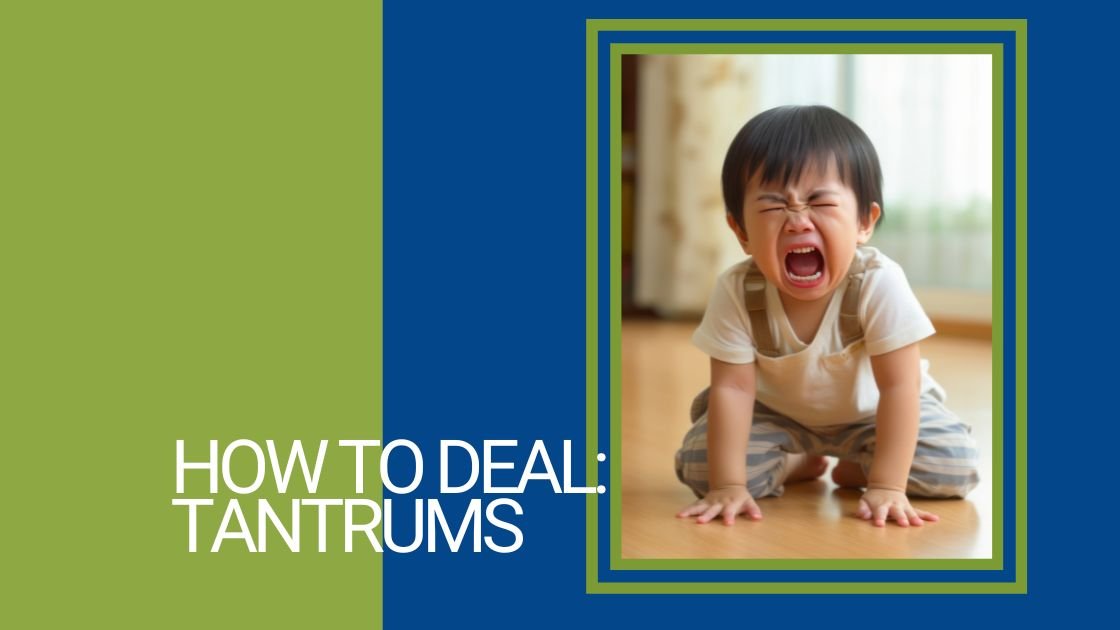How to Deal: Tantrums
You can see it coming, like a thunderstorm on the horizon. The build up, the pressure, the dread. Or maybe there’s no warning at all. All of a sudden, it’s here and there’s nothing you can do to stop it. It’s a tantrum, and it can be a parent’s worst nightmare.
Child Temper Tantrums
Most kids have had a tantrum at least once in their lives, and some children are much more prone to them, with daily occurrences (and maybe even several a day). As we get older, we’re more able to understand what’s happening and maybe recover from an unexpected or uncomfortable event more quickly.
Tantrums overwhelm kids for sure, and sometimes parents and whole families. They’re hard to handle, hard to stop, and hard to hear. Tantrums can be really scary for kids, believe it or not.
Why do Kids Throw Tantrums?
Tantrums can be caused by anything that overwhelms a little one’s ability to cope. Some common causes are:
Frustration: maybe they can’t do something they want to or they can’t express themselves clearly or quickly
Fatigue or hunger: these add up, cause irritability, and and can trigger tantrums
Changes: big or little disruptions can be challenging and upsetting, even if they seem positive (like a vacation)
Attention-seeking: as much as kids don’t like negative attention, it can be better than none. A tantrum is a surefire way to get full adult focus.
Over-stimulation: too much sensory input (noise, light, activity) can overwhelm a child and lead to a breakdown
Emotional overload: big feelings like anger, fear, sadness, or excitement can overwhelm kids and start a tantrum
Limit-testing: some tantrums are a result of being told no, and are a way of testing the limit to see if the adults will stay true to their word
(If we’re honest, all of these things can cause tantrums in adults, too, although they might not look exactly how they did when we were kids.)
How Do You Stop Tantrums?
There’s good news and bad news. The bad news is that once a tantrum starts, it likely won’t stop until your child has run all the way through it. Kids get flooded with big feelings and really can’t get regulated until the intensity goes down. Add in the fear and overwhelm they may feel about being out of control, and it can take some time to re-regulate.
The good news is that understanding why your child has tantrums can give you some clues about how to stop them before they start. For example, a common trigger can be hunger or fatigue. If you know these tend to cause irritability and overwhelm for them, be sure you keep a snack on hand and prioritize rest times.
Important: structuring to avoid tantrums does NOT mean taking “NO” out of your vocabulary if hearing it causes your child to throw a tantrum. Limits are too important, and your child needs to learn how to handle hearing them. A different idea for a limit-testing child is to let them know ahead of time what’s going to happen. “When we’re at the store, we’re getting only groceries and no toys. You’ll be able to pick the kind of apples you want.” Giving them choices that are okay with you can help them manage their disappointment.
How to Deal with Child Tantrums
If you’ve taken all the steps you can and a tantrum erupts, know you’re not a bad parent and you don’t have a bad kid. It’s one of the most embarrassing things that can happen in public, and your own emotions might trigger YOU. So first, take a deep breath, and get some privacy for you and your child if you can. If this means leaving your cart in the aisle in a store and going out to the car, do it.
Next, turn to your child. If you need to, remove them from a busy or unsafe situation. As much as you might want to, this is not the time to talk, threaten, or distract. You’re just waiting with them until they calm down. If you’re in a safe place like home and you know they won’t hurt themselves, it’s okay to step away, especially if you think the tantrum is attention-seeking or limit-testing. If they’re afraid or overwhelmed, stick close (see ideas for toddler tantrums, below).
When they start to calm, be ready to offer something that may help the process, maybe a tissue, a drink of water, or a hug. Keep your words to a minimum, though. Don’t overwhelm them again. Reassure them that they’re safe & all is well.
Don’t expect a whole lot of talking and/or listening to happen now. They’re still recovering. If you ask them why they acted that way, they probably won’t be able to tell you. If you set a limit, stick to it and keep going. This also would not be a time to lecture them about how you’ve told them over and over not to act that way. Honestly, if they could help it, they probably would have stopped themselves.
After they’ve calmed down, talk about what happened in a matter-of-fact way: “you got so mad that you couldn’t have that cookie, and then you calmed down. Way to go! I saved the cookie for you, and you can have it after dinner.”
You may want to give them a consequence or punishment for tantruming. If there is a natural consequence, let that happen. For example, if you had to leave a fun outing because of a tantrum, don’t go back. But don’t tie an overwhelmed, tired, toddler tantrum to a lesson you’re trying to teach so they won’t behave that way again. When tantrums happen, they’re usually just out of the child’s control–storm clouds build up and burst, and a previous punishment won’t stop the process. Instead, control what you can before the tantrum starts. As your child matures and masters more developmental tasks, tantrums will decrease.
Dealing with Toddler Tantrums
With really little kids, tantrums are even more unmanageable and unpredictable. They can happen for all kinds of reasons, including getting what they want, NOT getting what they want, not being able to tell you what they want, not being able to do things themselves, and not wanting to do things themselves.
How to Handle Toddler Tantrums
Toddlers are working on big developmental tasks. The ideas above still apply, but you can fine tune them based on what’s happening for your little one. Here are some ideas for handling toddler tantrums by age.
How To Deal with 2 Year Olds’ Tantrums
Two year old tantrums come up a lot. They’re a big part of the reason this age is “the terrible twos” for a lot of parents. Two year olds are working on becoming independent, and this is exciting and scary, all at the same time. Added to those tantrum-provoking emotions is the fact that their words and bodies are still catching up to the big feelings. So they’re feeling huge emotions and can’t tell you what’s happening or get their bodies to do all they want to do.
How to Deal with 2 Year Old Tantrums
Your two year old will need you closer to them when they have a tantrum. Your proximity alone should give them comfort. You don’t need to hold them or try to physically stop the behaviors. They’re going to need lots of comfort so knowing you’re there is vital. Stay calm and say little. Wait until they’re calm and offer a hug, a nap, whatever helps.
3 Year Old Toddler Tantrums
Threes are gaining ground in verbal and cognitive skills, but still feel emotions intensely and can have a hard time with schedule changes. And we know tantrums can come on the heels of big feelings. While 3 year olds may have more words and understanding than they did when they were 2, they’re still navigating some of the same tasks and have little control over their worlds. All of this can lead to big blow ups.
How to Deal with 3 Year Old Tantrums
To help avoid tantrums, help your three year old make choices that are okay with you–little choices can add up to big boosts in preparation and lower chances of upset. If they blow up, stick close, stay calm, say little, and be sure they’re safe. Let them move all the way through the process and when they’re on the other side, offer comfort. You can say more after they’ve recovered; for example, you can talk about how they got so mad when their toy broke, and point out that they calmed down. This will help them make some sense of the overwhelming experience they just had.
Four Year Old Tantrums
Parents of four year olds may feel like they should be in the clear when it comes to temper tantrums, but it’s not uncommon for kids this age to have intense feelings and for them to erupt into tantrums. Fours are figuring out about social interactions, roles they play with peers and in their families, and how much impact they have on others. They may use huge emotional outbursts to test limits as a result (and of course can still get overwhelmed like younger toddlers do).
How to Deal with 4 Year Old Tantrums
The same strategies that work with younger kids are a great way to help four year olds through their tantrums. When you can, remove them from the situation that’s upsetting them and give them and you some privacy. Take a breath, calm yourself, and remain close to them without trying to stop or control their actions. Wait. They should calm more quickly than when they were younger, and be more able to voice what would help them as they do calm down. They may ask you for a hug or to go home. Go along with their request when you can. After they’re calm, talk about what happened in a matter-of-fact way and point out how they got help/calmed down/managed their bodies. For example: “you really got upset when I told you we couldn’t stay at the park. When we got in the car, you started to calm down and got some water. Now you’re feeling better.”
The biggest thing to remember about tantrums is that you and your kids will get through them. If you feel like you’ve tried everything and it’s not getting better, it may be that some support might help. We offer in-person and virtual appointments, individual and family play therapy, and individual parent coaching and parent classes. If you’re wondering if we might be able to help your family, schedule a free phone consultation. We’ll answer your questions and help you know if we’re the right fit for you.


